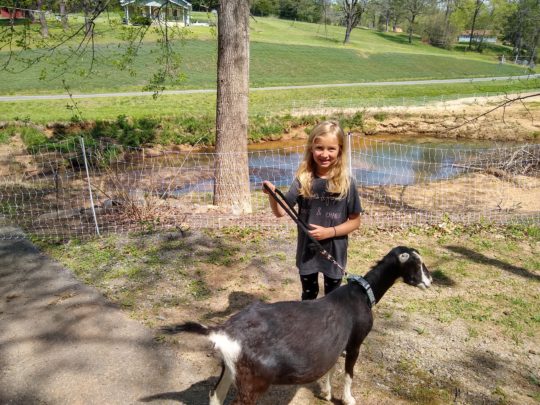
At Happy Egg Farm in Hickory, North Carolina, we raise Mini Lamancha dairy goats. We register our goats with the Miniature Dairy Goat Association (MDGA) using the herd name Happy Egg and the Tattoo HAPP.
Mini Lamanchas are the result of breeding a male Nigerian Dwarf goat with a female Lamancha goat. We like “mini manchas” because they have a very good temperament with our human kids, and are a nice manageable size. Once in milk, a doe reliably produces a quart of milk in the morning and another in the evening. Sometimes we get a little more, though we don’t usually try to maximize production. One or two goats provides plenty of milk for our family, and due to state laws we aren’t able to sell any extra milk that we produce. We value the goats on our farm as vegetation managers and entertainers, in addition to their dairy capabilities.
The goats on our farm are handled daily and are tame like pets. We aim to kid in the spring, ideally from March through June. That helps get the kidding dates into slightly warmer weather. We do not usually milk all of the goats that are in milk, because that would produce more than we would need. Instead we select one or two does and milk each one once per day in the morning. The dams raise the kids, so for the first several weeks, the kids get all of the milk. Then when it’s time for us to start milking, we separate the mothers from the kids each evening. We milk in the morning, then reunite them after milking. Milk from Lamanchas (including our minis) has a high butterfat percentage. For our own use we make cheese, yogurt, butter, custard, eggnog, and more. Goat milk is useful for crafts like soap making, and for supplementing feed for other animals.
Mini Lamanchas are productive members of a homestead, whether for milking, keeping fence lines clear, or just for pets! Depending on your needs and budget, we can supply registered goats, wethers, or quality pets. We have around 50 goats, odds are good we have the right goat for you!
Here are a few of our featured goats that are available, with details below the chart:
Summer 2025 Goats for Sale
| Goat | Status | DOB | Price |
|---|---|---|---|
| Meggie Moon | Bred Doe (due late May 2025) – F5 Gopher Ears | 2/28/2019 | |
| Lilac | Doe – F4 Gopher Ears | 4/8/2022 | |
| Peppermint | Doe – F3 Gopher Ears | 1/15/2023 | |
| Charlotte | Doe in milk with kids – F4 Gopher Ears (kids have no papers) | 3/25/2023 | |
| Surprise | Open Doe – F3 Gopher Ears | 3/25/2023 | |
| Lovey Dovey | Open Doe, F4 Gopher Ears | 2/15/2024 | |
| Sprinkles | Open Doe, F4 Gopher Ears | 2/15/2024 | |
| Cinnamon | Open Doe, F3 Gopher Ears | 3/21/2024 | |
| Males | |||
| Paddington | Buckling, F3 Gopher Ears | 3/18/2024 | |
| Sycamore | Mature Buck – F3 Gopher Ears | 3/9/2020 | $300 |
| Finn | Mature Buck, F5 Gopher Ears | 5/21/2020 | $200 |
| Fennel | Mature Buck, F3 Gopher Ears | 6/16/2022 | |
| Raincrow | Mature Buck, F2 Gopher Ears | 5/18/2019 | |
| Pets | |||
| Sugar Cube | Wether | 3/21/2024 | |
| Rusty | Wether | 4/15/2021 | $150 |
| Linden | Wether | 4/8/2022 | $150 |
| Saffron’s 2025 Kids | Doeling+Buckling, Pet Goats (no papers) | 2/28/2019 | |
| Apple Blossom’s 2025 Kids | 2 Doelings, Pet Goats (no papers) | 1/26/25 | |
| Mary | Open Doe, F4 Gopher Ears | 3/18/2021 | |
Charlotte’s kids were born on 2/20/2025, one doeling and one buckling.
Mary
Mary has been a very hardy goat all her life, she has a broad stature and loves cuddles and food. She is an open doe meaning she hasn’t kidded. Mary was one of two and would be the perfect pet or family animal.

Peppermint
Peppermint is also very hardy and has a very dairy body. Her favorite thing is milking time and she will stay tolerant and gentle as soon as she knows you. She is not the most sociable of does, however she can get into a routine quickly. Her first freshening was 2025 and went very smoothly. When she was not on the stand she would be begging for it. Peppermint was born in 2023 as a single. She would be perfect for someone looking for a milker and love and treats could become a very sociable doe.

Sycamore
Sycamore was the star of our 2021 kidding season and is sire to dozzens of our goats. We like his conformation and compact size as an F3. But from a genetic diversity standpoint, he’s valiantly served his purpose at our farm and is ready to come work for you. As long as we have him, he’s also available for stud service.
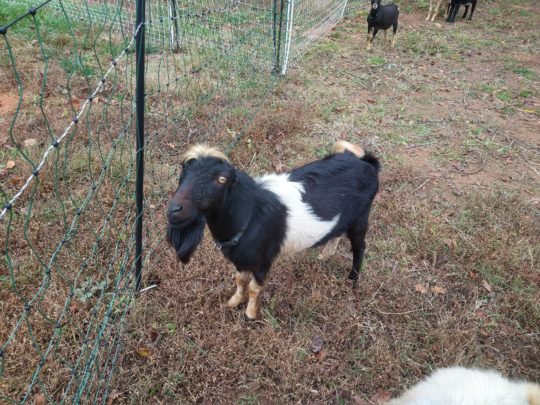
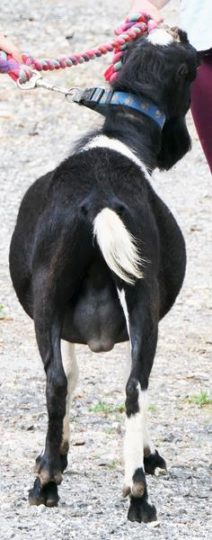
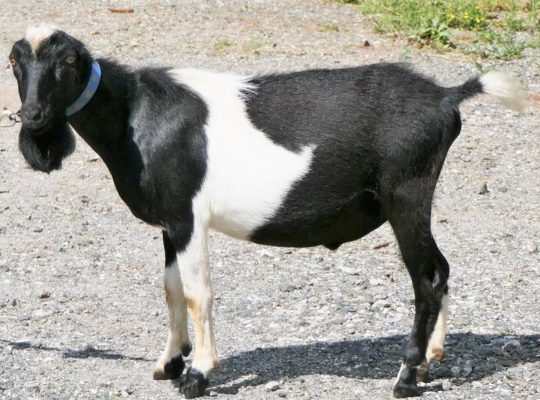

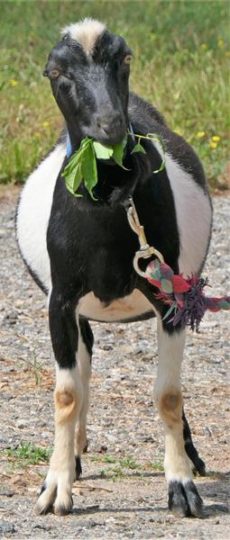
Rusty Rusty is a mostly-black wether.
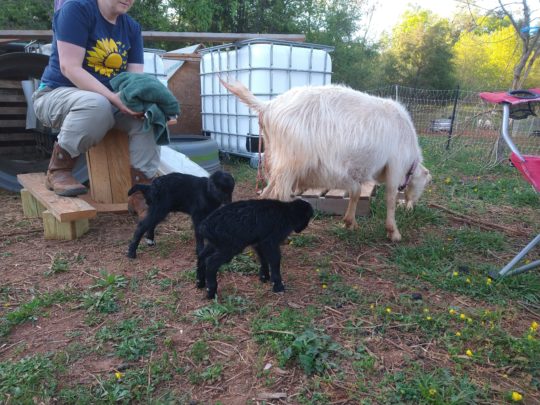
He was born on 4/15/2021 to one of our most hardy and independent does, Oriole. The sire was Sycamore, our F3 born in 2020 who is also for sale. He is nice and short and was castrated at the end of August 2022.
Linden
Linden is a wether from the spring 2022 kidding session. He is one of the most pretty colors of any of our goats for the season, but he has elf ears which make him ineligible for further breeding. He was surgically castrated in August 2022. He’ll make a great pet, or vegetation management technician. Based on our experience with other mini-mancha wethers, we expect him to mature to be around 2 feet tall at the withers (not to be confused with the wethers) and he’ll be able to clear brush up to a height of around 4 feet.
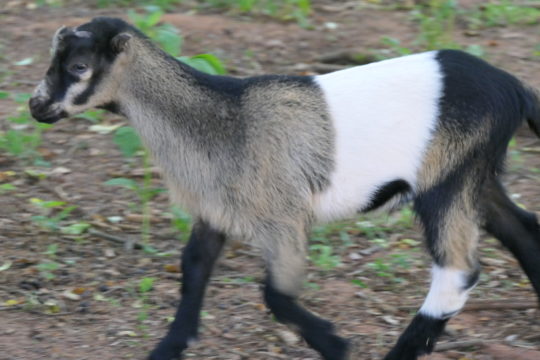
Banana Bread
This little buddy is Apple Blossom’s single 2023 buckling, born on 3/7/2023. F4 with Gopher ears, this little buckling has what looks to be a sturdy front end. He’s disbudded and ready to come to your farm, or available for stud services.
Speaking of stud service, we currently have several bucks available. Coordinate with us before kidding season so that we can have a plan, and a discussion about herd management and disease testing. Once your doe is in standing heat, bring her by for a visit. If she’s ready, it will take about 5 minutes in the driveway. The fee is $50, which trust me, is a much better option than keeping a stinky buck around during the rut season!
One option is “Dusty” (Starlight Dogwood), a poled, F3 cream buck
He was born 4/24/2021:
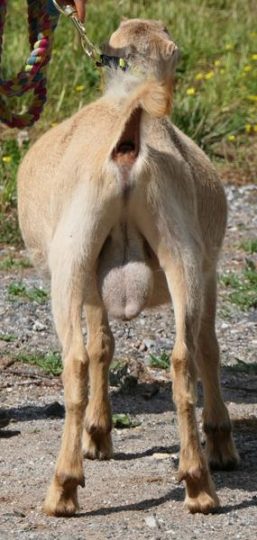
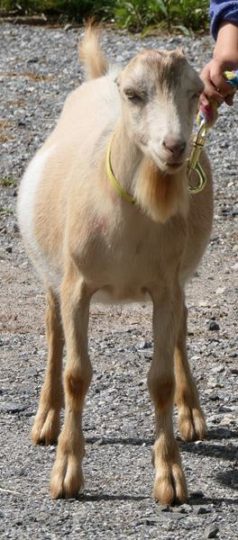

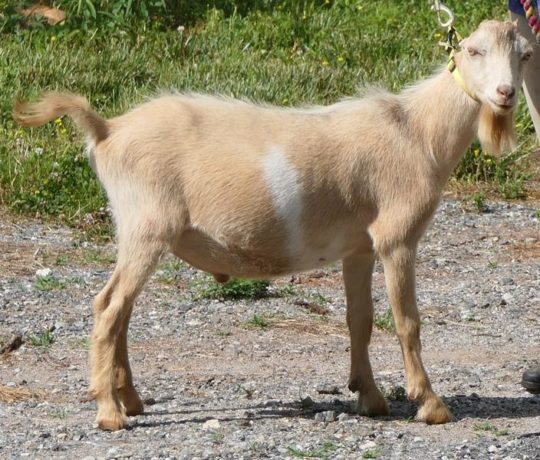
We also have our old standbys including Raincrow and Finn. 2022 has brought us a few new bucklings to be excited about too
Raincrow:
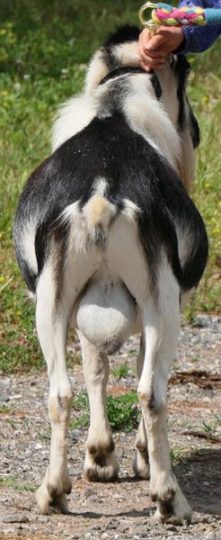
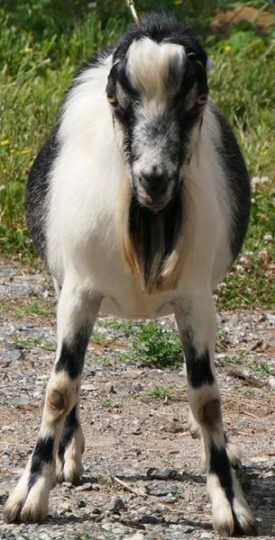
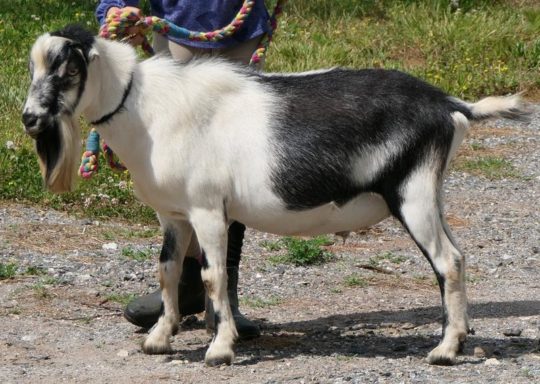

Finn:
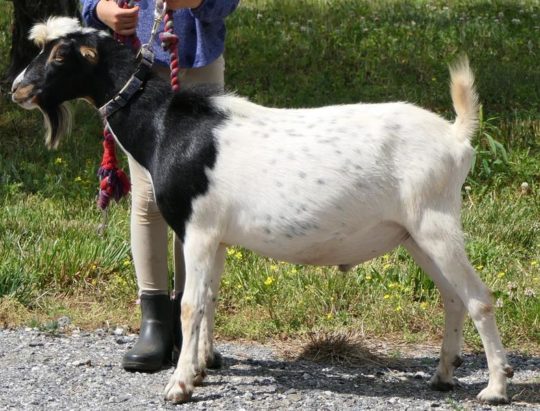
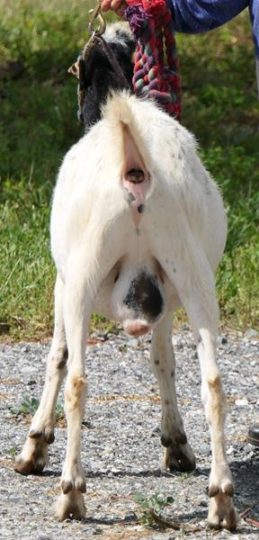
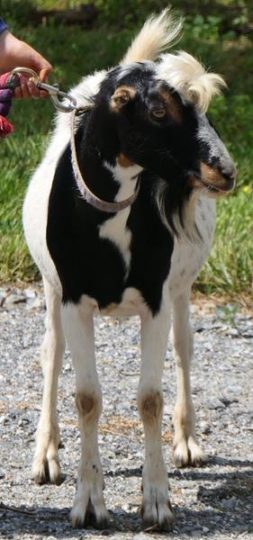

 Happy Egg Farm
Happy Egg Farm